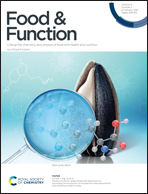Aloin protects mice from diet-induced non-alcoholic steatohepatitis via activation of Nrf2/HO-1 signaling
Abstract
Aloin, a naturally occurring anthraquinone glycoside derived from the Aloe species, has antioxidant and anti-inflammatory activities, but its role in non-alcoholic steatohepatitis (NASH) remains unknown. This study was designed to investigate the anti-inflammatory, antioxidant, and anti-apoptotic effects of aloin and the underlying mechanisms during NASH. Wild-type or nuclear erythroid 2-related factor 2 (Nrf2) knock-out (KO) mice were fed a choline-deficient, L-amino acid-defined, high-fat (CDAAH) diet and treated with aloin (10, 20 or 40 mg per kg bw per day) by gavage for twelve weeks. Liver and blood samples were collected to evaluate liver function, protein abundance, and histopathological status. Supplementing aloin at 20 mg kg−1 was optimal for mitigating liver damage during NASH, as evidenced by reduced alanine transaminase and aspartate aminotransferase activity in serum. Supplementation with aloin significantly reduced serum concentration or liver protein abundance of malondialdehyde, tumor necrosis factor alpha, Interleukin (IL)-1β and IL-6. Aloin treatment enhanced hepatic superoxide dismutase activity, glutathione and serum IL-10 levels in mice with NASH. Furthermore, supplementation with aloin inhibited hepatocyte apoptosis caused by Bcl-2 up-regulation and cleaved caspase-3 and Bax down-regulation. Mechanistically, by using Nrf2 KO mice, the protective effects of aloin were associated with enhanced antioxidant, anti-inflammatory and anti-apoptotic activity, all of which were mediated by Nrf2/heme oxygenase-1 (HO-1) signaling activation. Data suggested that aloin activates the Nrf2/HO-1 pathway and has protective potential against liver injury during NASH. Therefore, aloin supplementation might contribute to the prevention and treatment of NASH via activation of the Nrf2/HO-1 pathway.



 Please wait while we load your content...
Please wait while we load your content...